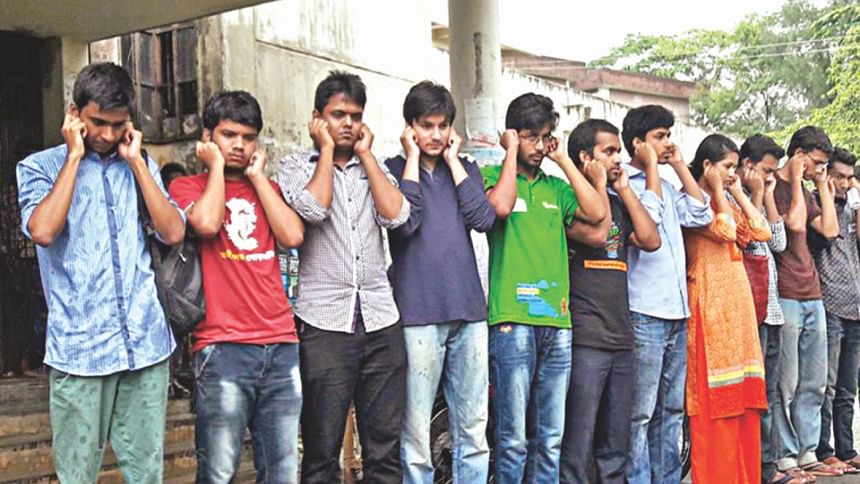Degrading punishment of a teacher - Rule of law or an MP's wrath?

The public shaming of Shyamal Kanti Bhakta, a headmaster and also a teacher of Narayanganj, and inaction against those responsible for humiliating him has exposed the fragile state of rule of law in the country. This outrageous incident mocks people's fundamental rights guaranteed by the Constitution. It makes worthless the legal system and the country's commitment to international legal instrument.
Article 35 (5) of the Constitution unequivocally states: "No person shall be subjected to torture or to cruel, inhuman, or degrading punishment or treatment."
This is one of the fundamental rights of every citizen of Bangladesh. It is a constitutional protection for every citizen including that of Shyamal Kanti Bhakta. But the constitutional guarantee remained only in paper when he was beaten up by a mob before he was made to do squats holding his ears in the presence of local Jatiya Party MP AKM Selim Osman on Friday. For a teacher, or anyone with self-respect, nothing can be more cruel, inhuman and degrading than this.
Those who decided to be the moral police to punish the teacher based on fabricated allegations against him cared little about the existing criminal law.
The state has enacted the Torture and Custodial Death (prevention) Act in 2013, criminalising such inhuman, cruel and degrading punishment or treatment to anybody. This law has been made to uphold the spirit of the Article 35 (5) of the Constitution and to meet the country's commitment to the United Nation's convention against torture, cruel, inhuman and degrading punishment and treatment. Bangladesh became a signatory of the convention in 1984. According to Section 2 (1) and 4 of the Convention, Bangladesh is obliged to enact a law to criminalise cruel, inhuman and degrading punishment and treatment.
An individual may be convicted and sentenced to jail up to five years if he is found guilty of torturing anybody or behaving in an inhuman, cruel and degrading way with another person, according to the Torture and Custodial Death (prevention) Act in 2013. A person may be sentenced to jail up to two years if he is found guilty of instigating or abetting in such torture. If punishing Shyamal Kanti Bhakta in ian nhuman, cruel and degrading way is not a criminal and punishable offence then what it is?
The incident has shocked the entire nation. Everybody - students, teachers and cultural activists - are staging stormy protests against the heinous act, and demanding action against the perpetrators. But the police have still taken no action as they have not been instructed by the government high ups to go for action.
Once again we are reminded that laws are often applied selectively, and for those who have power and influence, it may not apply at all. If the law ruled, law enforcement agencies would have taken immediate action after the incident took place in Narayanganj.
But things are moving in the opposite direction. The school managing committee has suspended Shyamal Kanti Bhakta, headmaster of Piyar Sattar Latif High School. He received a letter of his suspension while lying at a hospital bed.
The letter said he was suspended because "he physically tortured students, received money in the name of teachers' appointment, made derogatory comments about Islam, remained absent without leave and used to be late at work". The crucial allegations of making disparaging comments about Islam and torturing students have already been proved false.
But he was not given any notice to defend himself before the school had taken action against him. This is completely against the country's existing laws and also against the norms of natural justice.
Supporters of the MP, who presided over "the trial" of Shyamal on Friday, are now trying to gag the voices of people and media in Narayanganj. They are trying to portray the MP as a "noble" man by spreading a claim that the MP has saved the teacher's life from the mob's anger by arranging such a "trial". If the teacher committed any wrong, he should have been handed over to the police, a case could have been filed against him. But what the MP has done was enforce his own rule; it was not the rule of law. The so-called "trial" has degraded Shayamal's life and made a mockery of the country's Constitution and laws.
If the spirit of the rule of law is to be upheld, those who took part in this inhuman, degrading torture of a teacher, must be brought to book.
The writer is a Senior Reporter, The Daily Star.

 For all latest news, follow The Daily Star's Google News channel.
For all latest news, follow The Daily Star's Google News channel. 







Comments